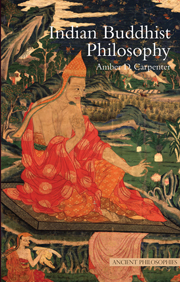Book contents
- Frontmatter
- Contents
- Preface
- Acknowledgements
- Abbreviations
- Chronology
- Development of Buddhist thought in India
- 1 The Buddha's suffering
- 2 Practice and theory of no-self
- 3 Kleśas and compassion
- 4 The second Buddha's greater vehicle
- 5 Karmic questions
- 6 Irresponsible selves, responsible non-selves
- 7 The third turning: Yogācāra
- 8 The long sixth to seventh century: epistemology as ethics
- Epilogue
- Background information
- Notes
- Bibliography
- Index
6 - Irresponsible selves, responsible non-selves
- Frontmatter
- Contents
- Preface
- Acknowledgements
- Abbreviations
- Chronology
- Development of Buddhist thought in India
- 1 The Buddha's suffering
- 2 Practice and theory of no-self
- 3 Kleśas and compassion
- 4 The second Buddha's greater vehicle
- 5 Karmic questions
- 6 Irresponsible selves, responsible non-selves
- 7 The third turning: Yogācāra
- 8 The long sixth to seventh century: epistemology as ethics
- Epilogue
- Background information
- Notes
- Bibliography
- Index
Summary
The fourth century or so of the Common Era saw an explosion of intellectual activity in India, accelerating into the ninth century, at which point Buddhism as a whole, and so Buddhist intellectual activity, began to decline in India. Non-Buddhist philosophy continued to flourish in India for several centuries, especially intensively from about 1000 CE, while Buddhist thought moved into separate geographical and intellectual contexts, particularly in Tibet and in China, which took up different parts of the Indian inheritance in substantially different ways.
Vasubandhu is perhaps the finest flower of this fourth-century activity. He was trained in the prominent Sarvāstivādin tradition of the Abhidharma, mastering in particular the version of the higher teachings set out in the Mahā-Vibhāṣa, the Great Commentary, whose adherents in Kashmir bore therefore the name Vaibhāṣikas. Vasubandhu was particularly reputed as a fierce debater, so it was not a welcome move when he subtly brought his fellow Vaibhāṣika Buddhists to account. His compendious Abhidharmakośa (The Treasury of Abhidharma) sets out the mature Buddhist position on all points of the ‘higher teachings’ – metaphysics, psychology, phenomenology, ethics – as these were understood by the Vaibhāṣikas. His own extensive commentary (bhāṣya) on this text, however, goes on not only to elucidate and explore but also to criticize several of the Vaibhāṣika positions, particularly those that tend towards metaphysical elaboration, rather than metaphysical minimalism.
In fact, it is not just the Vaibhāṣikas who come in for criticism.
- Type
- Chapter
- Information
- Indian Buddhist Philosophy , pp. 117 - 136Publisher: Acumen PublishingPrint publication year: 2013



